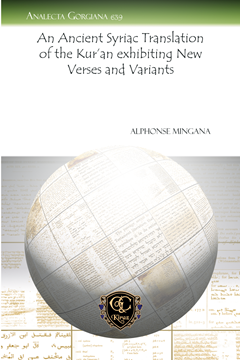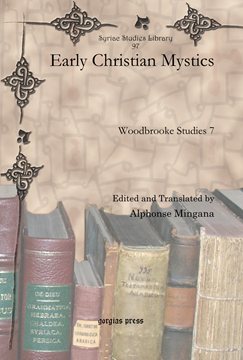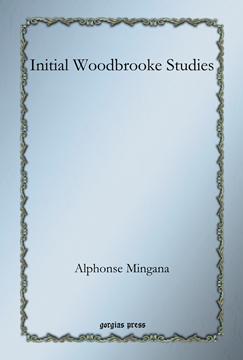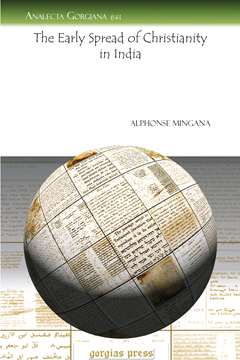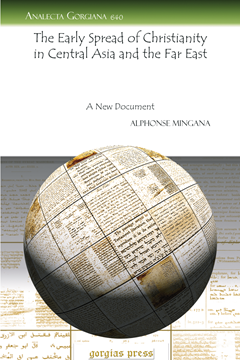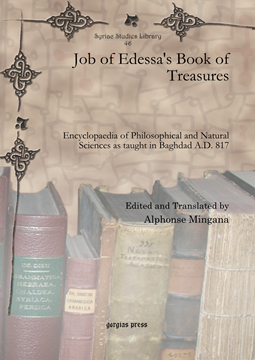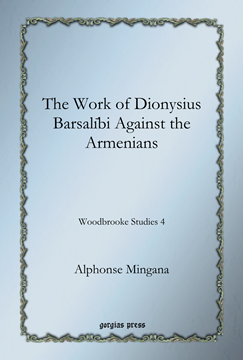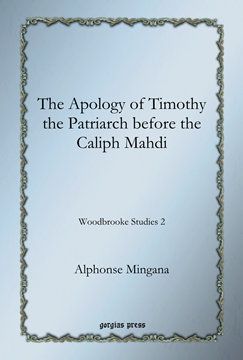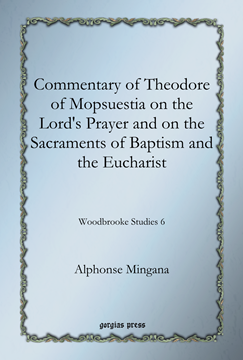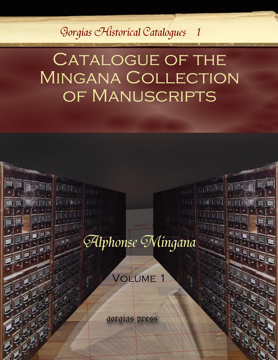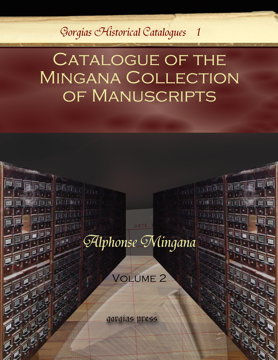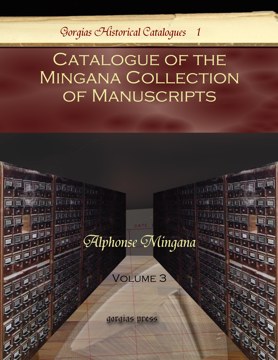Alphonse Mingana
An Ancient Syriac Translation of the Kur’an exhibiting New Verses and Variants
Series: Analecta Gorgiana 639
ISBN: 978-1-61719-588-4
The focus of this study is the final part of Dionysius bar Salibi’s polemical work against the Muslims, which contains a number of quotations from the Qur’an in Syriac translation.
$46.00 (USD) $27.60 (USD)
Early Christian Mystics
Woodbrooke Studies 7
Edited and Translated by Alphonse Mingana
Series: Syriac Studies Library 97
ISBN: 978-1-61719-196-1
This volume contains the Syriac texts and annotated English translations of mystical treatises from five authors of the Church of the East belonging to the 7th and 8th centuries.
$194.00 (USD) $116.40 (USD)
Initial Woodbrooke Studies
Woodbrooke Studies 1
ISBN: 978-1-59333-832-9
The initial installments of Alphonse Mingana’s “Woodbrooke Studies: Christian Documents in Syriac, Arabic, and Garshūni, edited and translated with a critical apparatus,” began as articles within the Bulletin of the John Rylands Library Manchester, starting in volume 11. In this initial foray into publishing the manuscripts in his personal collection, Mingana offers translations and critical comments on seven documents: A Treatise of Barsalībi against the Melchites; Genuine and Apocryphal Works of Ignatius of Antioch; A New Jeremiah Apocryphon; A New Life of John the Baptist; Some Uncanonical Psalms; the Vision of Theophilus; and the Apocalypse of Peter.
$188.00 (USD) $112.80 (USD)
The Early Spread of Christianity in India
Series: Analecta Gorgiana 641
ISBN: 978-1-61719-590-7
Mingana here looks at the early history of Christianity in India, with references to most (if not all) of the passages in Syriac and Christian Arabic literature, as well as other documentary evidence, pertaining to the subject.
$50.00 (USD) $30.00 (USD)
The Early Spread of Christianity in Central Asia and the Far East
A New Document
Series: Analecta Gorgiana 640
ISBN: 978-1-61719-589-1
The main goal of this study is to present data from Syriac and Christian Arabic writers, and some other sources, dealing with missionary activity and the expansion of Christianity into east Asia.
$49.00 (USD) $29.40 (USD)
Job of Edessa's Book of Treasures
Encyclopaedia of Philosophical and Natural Sciences as taught in Baghdad A.D. 817
Edited and Translated by Alphonse Mingana
Series: Syriac Studies Library 46
ISBN: 978-1-60724-909-2
This volume presents, in Syriac and English, Job of Edessa’s encyclopedic work covering all manner of scientific topics. It will be of interest to readers interested in Aristotelianism and the intellectual climate of the Middle East around the ninth century.
$214.00 (USD) $128.40 (USD)
The Work of Dionysius Barsalībi Against the Armenians
Woodbrooke Studies 4
ISBN: 978-1-59333-829-9
The Work of Dionysius Barsalībi Against the Armenians represents the nature of some disputes in the Christianity of the Middle Ages. Dionysius Barsalībi (d. 1171) in a very rare manuscript, begins by giving a brief sketch of the political and religious history of the Armenians. Dionysius argues that Christ’s body was corruptible up until the time of his death, and only after that did it become incorruptible. This underscores the fact that Christ had a true human body and that he digested food just like other people. The implications for this interpretation in connection with the Eucharist are obviously essential aspects to be resolved in this controversy.
$118.00 (USD) $70.80 (USD)
Commentary of Theodore of Mopsuestia on the Nicene Creed
Woodbrooke Studies 5
ISBN: 978-1-59333-828-2
The Commentary of Theodore of Mopsuestia on the Nicene Creed is an important document of an instrumental age in the development of Christianity. Theodore (c. 350-428) was clearly the most important biblical scholar of his age. While his theology eventually led to his loss of favor among some branches of the church, Theodore was at least partially responsible for three church councils held to deal with his ideas, including those of Ephesus and Chalcedon. Mingana has published here, as Woodbrooke Studies 5, for the first time a document that had previously been lost and which contains Theodore’s observations on the outcome of the Council of Nicaea, the Nicene Creed.
$145.00 (USD) $87.00 (USD)
The Apology of Timothy the Patriarch before the Caliph Mahdi
Woodbrooke Studies 2
ISBN: 978-1-59333-827-5
Part of Alphonse Mingana’s “Woodbrooke Studies” (of which the present book is volume 2), The Apology of Timothy the Patriarch before the Caliph Mahdi is accompanied in this volume by The Lament of the Virgin and The Martyrdom of Pilate. The namesake of the volume, Timothy’s apology for Christianity, is an eighth-century manuscript and one of the earliest documents concerning Christianity’s relationship with Islam. The Lament of the Virgin is Mary’s sadness at the empty tomb; in this piece she is conflated with Mary Magdalene. The Martyrdom of Pilate presents Pontius Pilate as a saint and lays out his spiritual accomplishments that are crowned by his martyrdom.
$167.00 (USD) $100.20 (USD)
Commentary of Theodore of Mopsuestia on the Lord's Prayer and on the Sacraments of Baptism and the E
Woodbrooke Studies 6
ISBN: 978-1-59333-830-5
The Commentary of Theodore of Mopsuestia on the Lord’s Prayer and on the Sacraments of Baptism and the Eucharist is an important witness to the development of Christianity. Theodore (c. 350-428) was clearly the most important biblical scholar of his age. In a series of six homilies Theodore here addresses the Lord’s Prayer as a springboard to discuss what actually constitutes prayer. His homilies on the sacraments are essential witnesses to the historical development of these sacraments. His work here is basically a commentary on the text of the liturgy, an awareness of the centrality of the sacraments to the life of the church in his age.
$155.00 (USD) $93.00 (USD)
Catalogue of the Mingana Collection of Manuscripts (1 of 3 volumes)
Series: Kiraz Historical Catalogues Archive 1
ISBN: 978-1-59333-542-7
This multi-volume set is the catalogue for the famed Mingana Collection of Syriac and Arabic manuscripts. A principal resource for scholars of early Middle Eastern documents, this set describes and summarizes the documents that make up this collection.
$239.00 (USD) $143.40 (USD)
Catalogue of the Mingana Collection of Manuscripts (2 of 3 volumes)
Series: Kiraz Historical Catalogues Archive 1
ISBN: 978-1-59333-545-8
This multi-volume set is the catalogue for the famed Mingana Collection of Syriac and Arabic manuscripts. A principal resource for scholars of early Middle Eastern documents, this set describes and summarizes the documents that make up this collection.
$196.00 (USD) $117.60 (USD)
Catalogue of the Mingana Collection of Manuscripts (3 of 3 volumes)
Series: Kiraz Historical Catalogues Archive 1
ISBN: 978-1-59333-546-5
This multi-volume set is the catalogue for the famed Mingana Collection of Syriac and Arabic manuscripts. A principal resource for scholars of early Middle Eastern documents, this set describes and summarizes the documents that make up this collection.
$196.00 (USD) $117.60 (USD)

